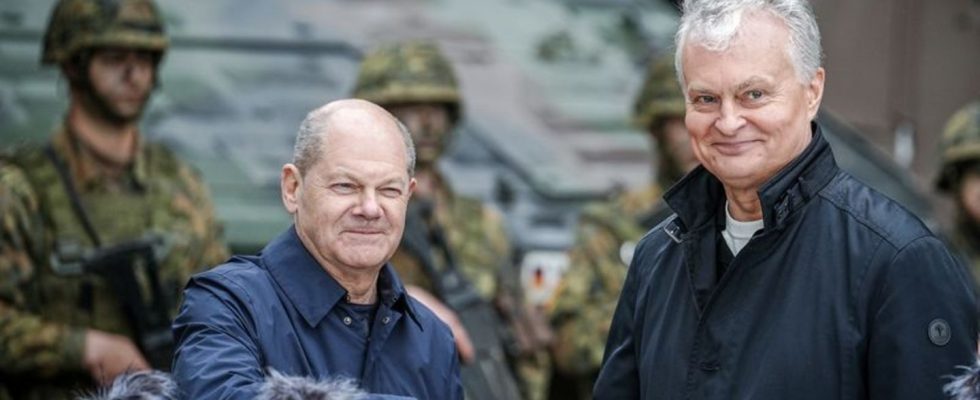Scholz in Lithuania
Germany remains steadfastly on the side of the Baltic states
Chancellor Olaf Scholz (l, SPD) and Lithuanian President Gitanas Naueda during a visit to the NATO exercise Quadriga 24. “Germany stands unwaveringly on the side of the Baltic states,” says the Chancellor. photo
© Kay Nietfeld/dpa
With the ongoing deployment of a combat-ready brigade on NATO’s eastern flank, Germany is making progress in the alliance. The Chancellor promises Lithuania a lasting commitment.
“Germany stands unwaveringly on the side of the Baltic states,” said the SPD politician in Pabrade in Lithuania, where he visited German soldiers. “And that means that we protect each other and that all states can rely on us to defend every inch of their territory.”
The Baltic states are currently particularly in focus in terms of security policy due to their proximity to Russia on NATO’s eastern flank. Since the Russian attack on Ukraine, Scholz has been to the Baltics several times to publicly assure the region of solidarity. The governments in Lithuania, Estonia and Latvia are warning that after the war of aggression against Ukraine, Russia could also test NATO’s defensive will and create military conditions for this within a few years.
The Chancellor on the Boxer armored personnel carrier
Today the Chancellor, dressed rustically in jeans and hiking boots, experienced a combat exercise with live ammunition at Lithuania’s largest military training area. Scholz himself was taken to a hill above the extensive and sparsely vegetated area on a Boxer armored personnel carrier. Then he and Lithuanian President Gitanas Nauseda had various combat situations explained to them under a tent, protected from light rain.
Scholz then spoke to German soldiers who were taking part in a major NATO exercise. The alliance is responding to the new security policy situation with a whole series of exercises called Steadfast Defender. According to the federal government, it is the largest NATO maneuver since the end of the Cold War around 35 years ago.
A total of around 90,000 soldiers are being mobilized to practice raising the alarm after an alliance collapses, moving large units of troops and defending against an attacker in combat. Germany is taking part in the major maneuver with 12,000 Bundeswehr soldiers and several of its own exercises under the name Quadriga over five months – including together with Lithuanian and French forces.
German brigade in Lithuania ready for combat until 2027
The commitment of the German Bundeswehr in Lithuania is serious, emphasized Scholz. In response to the changed security situation in Europe and Russia’s aggressive behavior, the federal government has begun to deploy a combat unit into the country that is ready for combat and capable of acting independently. According to the timetable, the brigade should be operational by 2027. The federal government is talking about a “lighthouse project as part of the changing times”.
According to the Lithuanians, the Rudninkai military training area – not far from the border with Belarus – will become the new duty station for most of the German soldiers. The remainder will be stationed in Rukla in central Lithuania. An incident team made up of experts in logistics, IT and infrastructure has been in the country since April.
Lithuania borders Russia’s ally Belarus and Russia’s Baltic Sea enclave of Kaliningrad. A narrow land corridor runs between the two countries from Lithuania west to Poland – NATO’s so-called Suwalki Gap, over which fighting could break out in the event of an attack. The concern: With an advance there, Russia could cut off the Baltic states from the other NATO countries and thus test the West’s willingness to defend themselves. For the Lithuanians, Germany’s deployment of troops is a desired reassurance of NATO’s obligation to provide assistance.
Lithuania calls for increased military spending in NATO
Nauseda thanked Scholz for his contribution to strengthening Lithuania’s defense. “We greatly appreciate this decision and, as a host country, are prepared to create the best possible conditions for the German soldiers and their families on our soil,” he assured. At the same time, Nauseda urged people to speed up. “We don’t have the luxury of wasting even a minute,” he stressed.
We will be watching with interest to see whether and how the Lithuanians are making progress with the creation of the promised infrastructure. This includes military areas and barracks as well as apartments and houses. The soldiers and their families will live in Vilnius and Kaunas, where a school and a kindergarten are to be built. According to the Ministry of Defense, it has not yet been finally clarified which infrastructure will be paid for by the Lithuanian side. It is also currently unclear how many family members could go to Lithuania.
The same applies to financing from the federal budget. According to the Defense Ministry, armament investments of six to nine billion euros are expected to build a combat-ready brigade. A large part of it is needed for large weapons systems. In addition, annual operating costs of around 800 million euros are expected from 2027. The ministries are currently in budget negotiations with Finance Minister Christian Lindner, during which the budgets for the coming year and medium-term planning are being finalized.
Lithuania is calling for higher military spending in NATO, as is Poland, which wants three percent as a new target. Scholz emphasized in Lithuania that Germany itself is investing massively in expanding its defense capabilities. This is “connected with the decision that investments in the Bundeswehr will cover two percent of our economic output in the long term, year after year,” he said. And: “That has been achieved this year and will not change again.”

